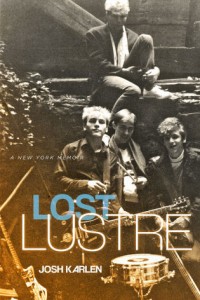So while I have seen no noticeable changes in the past six years, I can assure you things were very different 20 or 30 years ago. Times Square used to be disgusting (in a different way than it is now...more drugs, less tourists); the Meatpacking District actually was meatpacking before it had drug dealers, prostitutes, and the Mob, BEFORE it had trendy restaurants and nightclubs; and the Lower East Side, once housing immigrants, was full of drug dealers before it was full of the hipsters that currently reside there. And this drug-infested Lower East Side (or specifically, Alphabet City, which one could argue is more East Village than LES, because the LES is technically below Houston) of the seventies and eighties is the one in which author Josh Karlen was raised and reflects upon in his memoir, Lost Lustre. Karlen lived during a very specific moment in this neighborhood's history (and every NYC neighborhood has a colorful history) that, in a way, led it to what it is today. Cheap rent attracted the bohemians that created the strong music scene (think CBGBs) of these two decades, for which the neighborhood is still known.
But enough about NYC history—Lost Lustre is a great blend of the memoir of a person and of a place. It's Karlen's individual story, but his experience was entirely dependent on his environment. Surviving as a middle-class white kid in a neighborhood that was primarily lower-class African American and Latino was no easy task for Karlen. He describes how fear and defense dominated his mindset; you couldn't count the number of times he was mugged on only two hands. His reminisces, told in an essay sort of format, range from his innocence of the sixties to being dropped in a new environment where he's afraid of walking after dark, to the rise of the East Village music scene and the ease of underage drinking, to his first teenage love and his adjustment to life at a midwest college.
Karlen must be a talented writer, because I was so sucked into a place and time I never experienced that I felt like I knew it intimately. His attention to detail—something like describing how the light hit a room—perfectly set a tone to take the reader back in time, to put the reader in Karlen's own memories.
As I was reading this, I intuited two things about Karlen:
- He's a hopeless nostalgic. And I mean that in the way the phrase "hopeless romantic" is used, as a good thing, which indicates someone who treasures memories and uses his experiences to learn and grow as an individual.
- He probably has more issues with his adolescence than he is letting on.
And after a couple of email exchanges with the author, in which I asked him if there was, in fact, anything he "got out" of his experiences, he summed up his feelings quite well:
"If there is anything positive resulting from growing up in Alphabet City in the 70s it is only in the sense that any negative experience tends to broaden one's view of the world, expand one's vistas, however dismaying they may be. I often felt that the drugs, violence, poverty and Latino culture surrounding me, a white, middle-class kid, on Avenue C, gave me early on a broader context of seeing my life than those of my middle-class, New York school friends...
...In writing my book, I sought only to convey my own personal experience of growing up in that particular time and place, and for me it was mostly a dark and difficult time, partly because growing up is difficult anywhere, and partly because in downtown New York we were allowed to run it out to our furthest limits without any real boundaries in a city that was itself struggling to survive. So while I do have a certain nostalgia for pieces of my adolescence in New York, and I write of them in the book, it's very much mixed with other feelings that are not especially fond. I hope I managed to convey both the light and the dark of those growing up years in New York, if not equally, at least in proportion as I felt them then, and see them in retrospect."
For both memoir fans and NYC enthusiasts, this is a must.
This is a stop on Lost Lustre's TLC Book Tour. To hit up its other stops, visit this list.


No comments:
Post a Comment